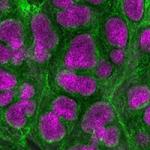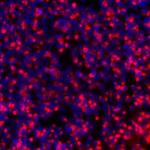
Isaac Brownell, M.D., Ph.D.
Senior Investigator
Cutaneous Development and Carcinogenesis Section
NIAMS
Research Topics
Dr. Brownell studies the regulation of cutaneous stem cells and the molecular pathogenesis of skin cancer. A current research focus is the biology of neuroendocrine Merkel cells and the oncogenesis of Merkel cell carcinoma. Using mouse genetics, he investigates the signals that regulate skin stem cell development and maintenance. Mouse models are also used to study targets identified by high-throughput oncogenomic analysis of human skin tumors. In complementary studies, high-throughput screening techniques are used to identify novel therapeutic targets and treatments for skin cancers. In collaboration with oncologists in the National Cancer Institute, Dr. Brownell conducts early phase clinical trials treating skin cancer.
Biography
Isaac Brownell, M.D., Ph.D., is a board-certified dermatologist and a fellow of the American Academy of Dermatology. He directs a research program that includes basic, translational, and clinical investigations of skin homeostasis and skin cancer. Dr. Brownell is an attending physician on the NIH Clinical Center’s Dermatology Consultation Service and he co-directs the Cutaneous Oncology Program at the Murtha Cancer Center, Walter Reed National Military Medical Center. He is also an Adjunct Investigator at the National Cancer Institute (NCI).
Selected Publications
- Xiao Y, Thoresen DT, Williams JS, Wang C, Perna J, Petrova R, Brownell I. Neural Hedgehog signaling maintains stem cell renewal in the sensory touch dome epithelium. Proc Natl Acad Sci U S A. 2015;112(23):7195-200.
- Harms PW, Harms KL, Moore PS, DeCaprio JA, Nghiem P, Wong MKK, Brownell I, International Workshop on Merkel Cell Carcinoma Research (IWMCC) Working Group. The biology and treatment of Merkel cell carcinoma: current understanding and research priorities. Nat Rev Clin Oncol. 2018;15(12):763-776.
- Xiao Y, Thoresen DT, Miao L, Williams JS, Wang C, Atit RP, Wong SY, Brownell I. A Cascade of Wnt, Eda, and Shh Signaling Is Essential for Touch Dome Merkel Cell Development. PLoS Genet. 2016;12(7):e1006150.
- Mohsin N, Hunt D, Yan J, Jabbour AJ, Nghiem P, Choi J, Zhang Y, Freeman AF, Bergerson JRE, Dell'Orso S, Lachance K, Kulikauskas R, Collado L, Cao W, Lack J, Similuk M, Seifert BA, Ghosh R, Walkiewicz MA, Brownell I. Genetic Risk Factors for Early-Onset Merkel Cell Carcinoma. JAMA Dermatol. 2024;160(2):172-178.
- Kaufman HL, Russell J, Hamid O, Bhatia S, Terheyden P, D'Angelo SP, Shih KC, Lebbé C, Linette GP, Milella M, Brownell I, Lewis KD, Lorch JH, Chin K, Mahnke L, von Heydebreck A, Cuillerot JM, Nghiem P. Avelumab in patients with chemotherapy-refractory metastatic Merkel cell carcinoma: a multicentre, single-group, open-label, phase 2 trial. Lancet Oncol. 2016;17(10):1374-1385.
Related Scientific Focus Areas
This page was last updated on Friday, August 30, 2024




